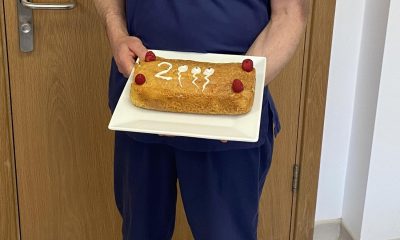By Mark Waghorn via SWNS
Joining a choir could help patients recover from a stroke, according to new research.
Singing improves language skills and mental health of victims and their families, researchers found.
The group intervention provides opportunities for peer support while being simultaneously cost effective.
Dr. Sini-Tuuli Siponkoski, of the University of Helsinki, said: "Our study is the first where caregivers participated in rehabilitation and their psychological wellbeing was evaluated."
Around four-in-ten survivors lose the ability to talk - a condition known as aphasia. It's usually caused when blood supply to the left side of the brain is cut off.
It causes considerable upset to patients and their families. Current treatments have varying degrees of success, but are not available to sufficient numbers, or provided early enough.
via GIPHY
Half of cases persist for at least a year. It has wide-ranging effects on ability to function and quality of life, often leading to social isolation.
Scientists have shown singing skills can be retained even in severe aphasia. But its use, especially choral singing, in rehabilitation has not been analyzed.
Co-author Dr. Anni Pitkaniemi said: "Our study utilized a wide variety of singing elements, such as choral singing, melodic intonation therapy and tablet-assisted singing training."
In melodic intonation therapy, speech production is practiced gradually by utilizing melody and rhythm to progress.
It has been employed to some extent to combat aphasia, typically implemented as individual therapy but requires a great deal of resources.
The study included 54 patients with chronic aphasia and 43 family caregivers. Rehabilitation sessions were led by a trained music therapist and choir conductor.
Participants were split into two groups that received a four-month singing intervention either during the first or second half of the study in addition to standard care.
via GIPHY
It comprised weekly group-based training - including choir singing and group-level melodic intonation therapy - and tablet-assisted training at home.
It improved everyday communication and responsive speech production faster than standard care after five months.
Improvements were sustained over the next four months. Additionally, the intervention enhanced patients' social participation and reduced caregiver burden.
Siponkoski said: "This study provides novel evidence that group-based multicomponent singing training can enhance communication and spoken language production in chronic aphasia as well as improve psychosocial wellbeing in patients and caregivers."
Patients were assessed on tests and questionnaires on communication and speech production, mood, social functioning and quality of life and family caregivers with surveys on burden.
Siponkoski said: "In addition to training in speech production, group-based rehabilitation provides an excellent opportunity for peer support both for the patients and their families."
The findings in Brain Communications follow a recent study by the same Finnish team that showed listening to favourite pop stars speeds up stroke recovery.
Exposing patients to vocal music improved language skills notably more than hearing instrumental tunes or audio books.
The sounds boost connections between neurons in the brain's frontal lobe which controls communication.
Around 100,000 Britons have strokes each year. There are 1.3 million stroke survivors in the UK.

 Parenting1 week ago
Parenting1 week ago
 Lifestyle7 days ago
Lifestyle7 days ago
 Wildlife3 days ago
Wildlife3 days ago
 Good News4 days ago
Good News4 days ago
 Health4 days ago
Health4 days ago
 Broadcast1 week ago
Broadcast1 week ago
 Environment1 week ago
Environment1 week ago
 Work2 days ago
Work2 days ago






















